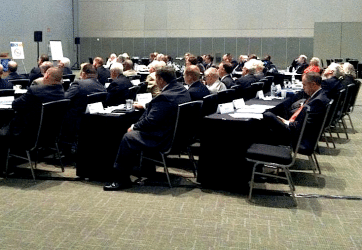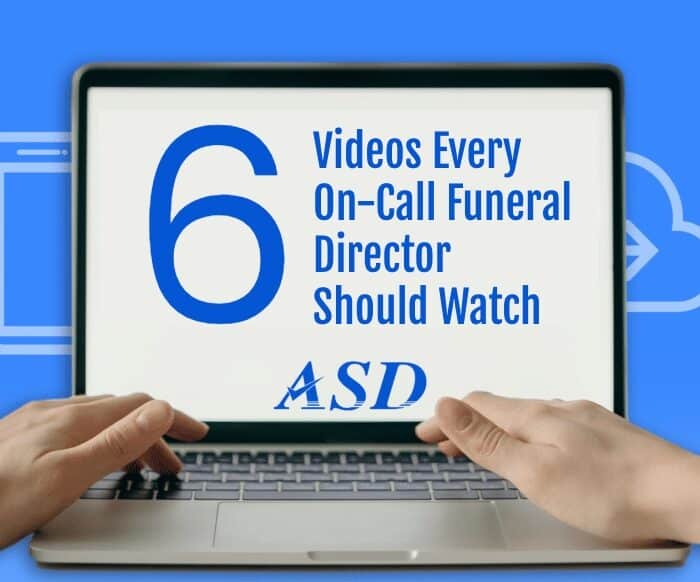Nov 05, 2013
The NFDA convention is the best opportunity all year for funeral professionals to hear insights from funeral experts on a wide variety of subjects. Everything from embalming tips, to legal advice, to the latest advancements in funeral technology are covered in detail at the NFDA convention. This year, the ASD team attended the NFDA convention with Bobby Condon, a Funeral Director at Kevin M. Lyons Funeral Home in Glenolden, PA. Bobby attended the convention as ASD’s Client Ambassador and spoke to funeral directors about how ASD’s specialized training and technology helps the directors at his firm. Bobby also attended several workshops alongside ASD Public Relations Specialist, Jessica Fowler.
If you weren’t able to go to the show or couldn’t attend the following workshops, we wanted to share with you some of the insights and tips we picked up. It was difficult to choose between so many insightful speakers and informative topics, but three classes immediately got our attention when we first received the NFDA’s Convention Workshop schedule:
Insights and Tactics to Increase Your 2014 Market Share
Presented by Lynn Elliott, CRME, Media Demographics
How the Connecticut Funeral Directors Association Faced the Challenges of Newtown
Presented by John F. Cascio, CFDA Executive Director, Pasquale S. Folino, CFDA 2012-2013 President and Laura R. Soll, CFDA Media and Public Relations
Battling Burnout: Management Techniques for Caregivers
Presented by Dr. John D. Canine, Maximum Living Consultants
While the topics may be diverse, they share one common component: the focus on communication. While Ms. Elliott discussed the importance of marketing messages, Dr. Canine explained the significance of interpersonal communication between funeral directors and their staff. The CFDA, meanwhile, explained how the Newtown tragedy showed the world the human side of funeral service because the association established itself as the central point of communication immediately after the tragedy occurred. Here are some of the communication tips we gathered for you during our time in these 2013 NFDA workshops:
1) Use every available channel to connect with your community
During her workshop, Lynn Elliott explained funeral professionals must maximize every opportunity to reach their local communities and past customers or their competitors will. Ms. Elliott gave several examples of different channels funeral directors should use to reach the public including logo items, radio, television, billboards and newspapers. While Ms. Elliott recommended funeral homes diversify their marketing efforts, she placed a strong emphasis on online communication. She also explained why creating an engaging site is only one part of the equation. Funeral homes that take advantage of tools from Google to evaluate incoming traffic, bounce rates and keyword searching will attract more visitors to their site. Ms. Elliottt recommended funeral home owners monitor this information on a weekly basis.
2) During a tragedy, cohesive communication is critical.
In 2008, the Connecticut Funeral Directors Association developed a Pandemic Mass Fatality Plan in the event the state was affected by a major pandemic like the Avian flu. While this plan could not have prepared directors in that state for the senseless tragedy in Newtown, it did provide a blueprint the association could use as a foundation to mobilize directors in their state. Within several hours of learning about the event, Executive Director, John Cascio, sent out a Call to Action to all CFDA members asking for assistance in response to the tragedy. More than 220 CFDA members responded and the association worked to assign volunteer teams, assemble supplies and inform the media. The CFDA also immediately set up a fund for the families of the victims, resulting in more than $92,000 for the 26 families. Without the CFDA as a central point of communication, the response to this tragedy may have been less organized. Their foresight and adaptability helped bring a sense of order to such a chaotic time.
3) Express your feelings and vent your frustrations
At the workshop, “Battling Burnout: Management Techniques for Caregivers”, Dr. John D. Canine explained the cycle of burnout and then gave suggestions for how funeral professionals can manage feelings of stress or compassion fatigue. One point that Dr. Canine emphasized was the importance of having a person outside of the job with whom you can be 100% honest with about the stress factors involved with such an emotional profession. According to Dr. Canine, communicating feelings about work to another person is crucial to staying on top of tasks and avoiding burnout.
4) Track your telephone patterns
Your funeral home’s telephone is vital to creating a positive first impression and securing new business. ASD records all calls and allows you to track your calls through our website or mobile app, but what about business hours when your lines are not forwarded to us? During her workshop, Lynn Elliott recommended a website that provides a fantastic solution to this problem. Visit www.callrail.com to learn how to track where your calls are coming from and hear call recordings to monitor your funeral home staff’s customer service.
5) Keep the media informed, but at bay
Whether you’re handling a funeral for a celebrity, politician or well-known person in your community, a high-profile service can present major challenges for a funeral director. The biggest of these challenges is the Media which is often more concerned with finding a good story than respecting the privacy of the bereaved. When the Connecticut Funeral Directors Association learned about the tragedy at Sandy Hook Elementary School, they understood the role of funeral service in a tragedy was about to be put under a microscope by the media.
“It was our priority to keep the media from violating privacy,” said Laura Soll, CFDA Media and Public Relations, during the association’s workshop at the NFDA convention. “If we could keep the Media aware of the funeral information, we could ensure they would not bombard funeral homes or families. If reporters didn’t get information, they might show up at the funeral home or the family’s doorstep.”
The CFDA became the central point of contact for the media after the tragedy at Sandy Hook. When an interview was requested, the associations chose a funeral director based on their availability and article subject and then coached the funeral home before the interview. The association’s handling of this tragic event is an example all funeral directors can look to when faced with arranging a high-profile service. According to the CFDA, 99.9% of all reporters were “exceedingly respectful” because they had a contact for their inquiries.
6) Monitor your staff’s stress levels
Dr. Canine wanted to make sure funeral directors that attended his workshop knew how to recognize signs of burnout not just in their own lives, but also in their employees’ performances. He recommended that owners and managers evaluate their staff to ensure they are not experiencing unrelieved work stress. According to Dr. Canine, burnout is characterized by a loss of energy, lowered resistance to illness, increased pessimism and increased inefficiency at work.
7) Stay in touch
One of the major points made during Lynn Elliott’s workshop was the importance of remaining in contact with families served in the past. Lynn recommended every funeral director in attendance set a goal for 2014: Collect email addresses for every family served during the arrangement conference. Lynn suggested funeral directors send out a quarterly newsletter to families as well as a holiday condolence card. By obtaining email addresses, directors can also reach out to families with electronic surveys to get feedback on their experiences using the funeral home. According to Ms. Elliott, survey responses from families are “the most valuable information funeral homes can receive.”
8) Embrace help from the funeral service community
One of the most important lessons learned from the Sandy Hook was that during a disaster, funeral directors must be willing to combine their efforts to help the victims and their families after a major tragedy. When disaster strikes, it is easier to become defeated without a strong support system around you. Embracing help from competitors may be unthinkable to some business owners, but for the directors there is a much stronger kinship within the funeral service community. By establishing a relationship with other funeral homes and becoming involved with your local funeral director association, you will be better equipped to tackle any unexpected crisis with the help of a strong support system.
9) Become an expert and resource to your community
“Why do people go to hospice to learn about death? Their expertise is dying, not death,” asked Dr. Canine during his workshop, Battling Burnout: Tips for Caregivers. “They should be coming to funeral directors for that information.” Dr. Canine went on to explain that funeral directors must position themselves as death care experts in their community. By providing information to the public and becoming a resource to those with questions, you will be appreciated more for the work you do. “For better or worse,” Dr. Canine said, “People will always remember their experience with a funeral director.”
What were some of the innovative ideas and informative workshops you saw at NFDA this year? Leave us a comment and tell us about them!
About The Author
Jess Farren (Fowler)
Jess Farren (Fowler) is a Public Relations Specialist and Staff Writer who has been a part of the ASD team since 2003. Jess manages ASD’s company blog and has been published in several funeral trade magazines. She has written articles on a variety of subjects including communication, business planning, technology, marketing and funeral trends. You can contact Jess directly at Jess@myASD.com


